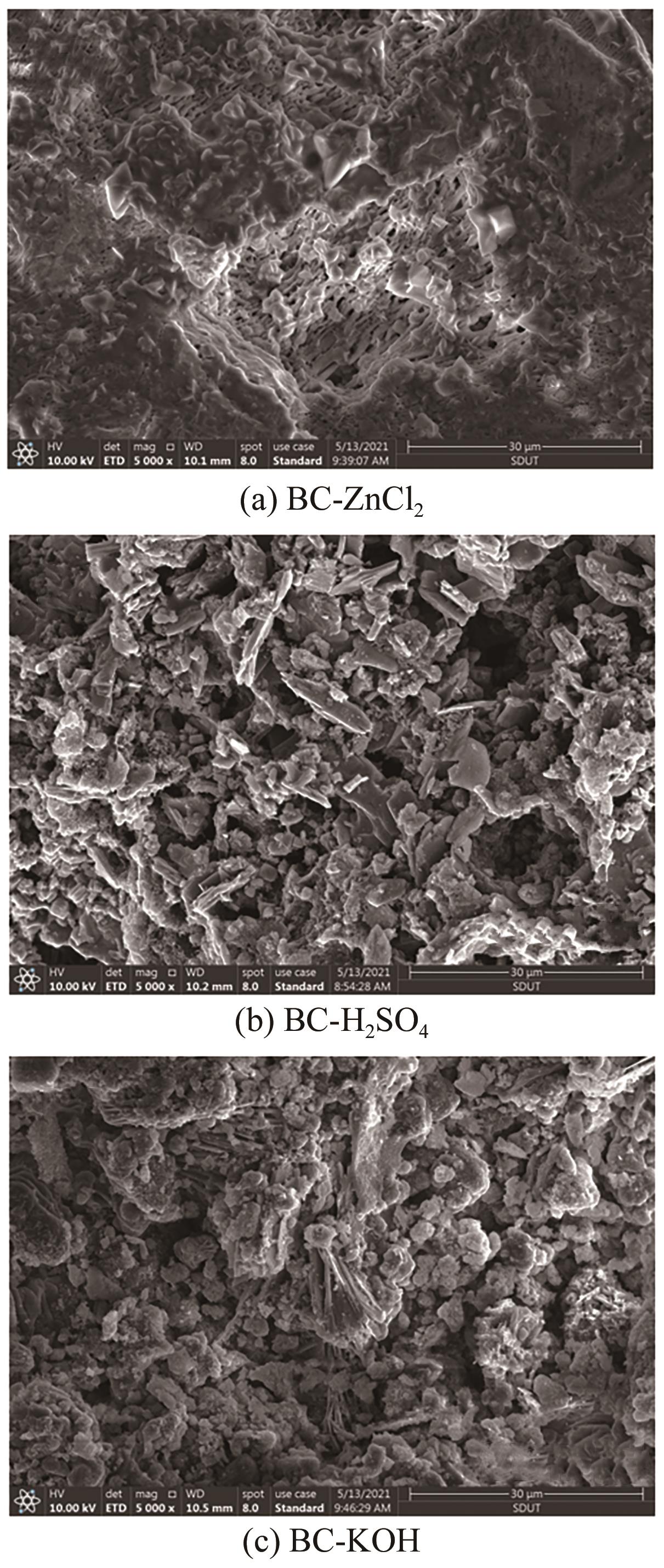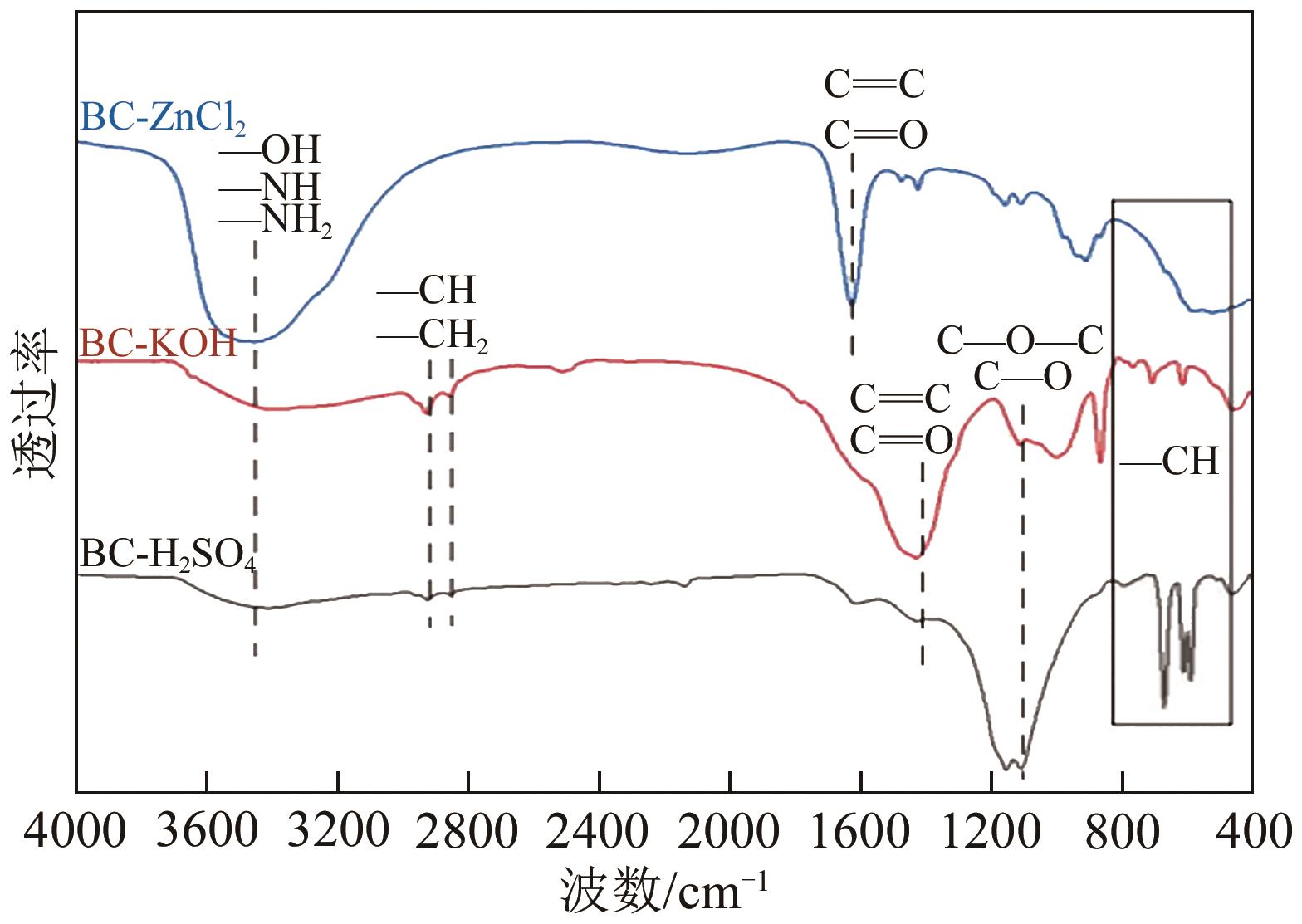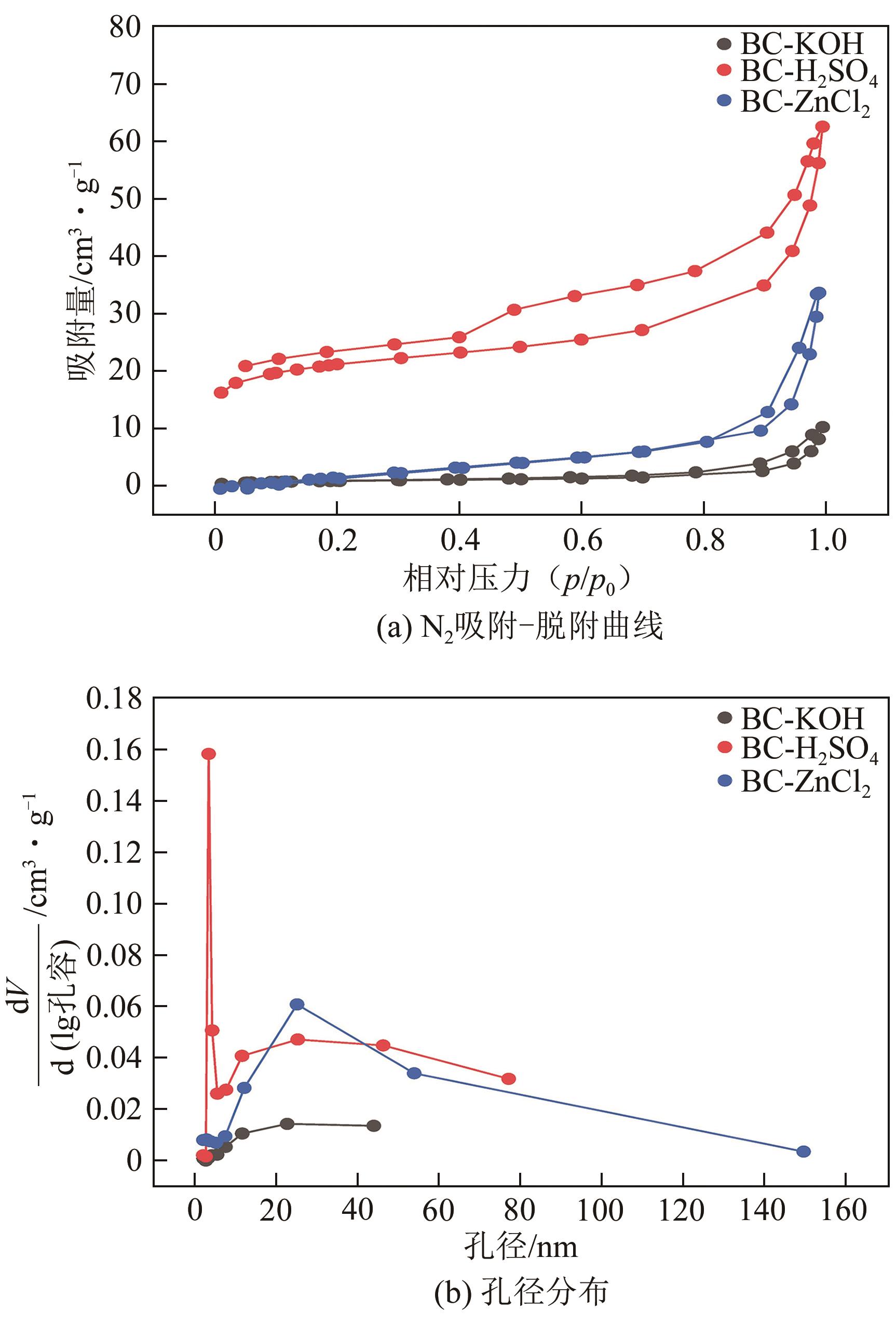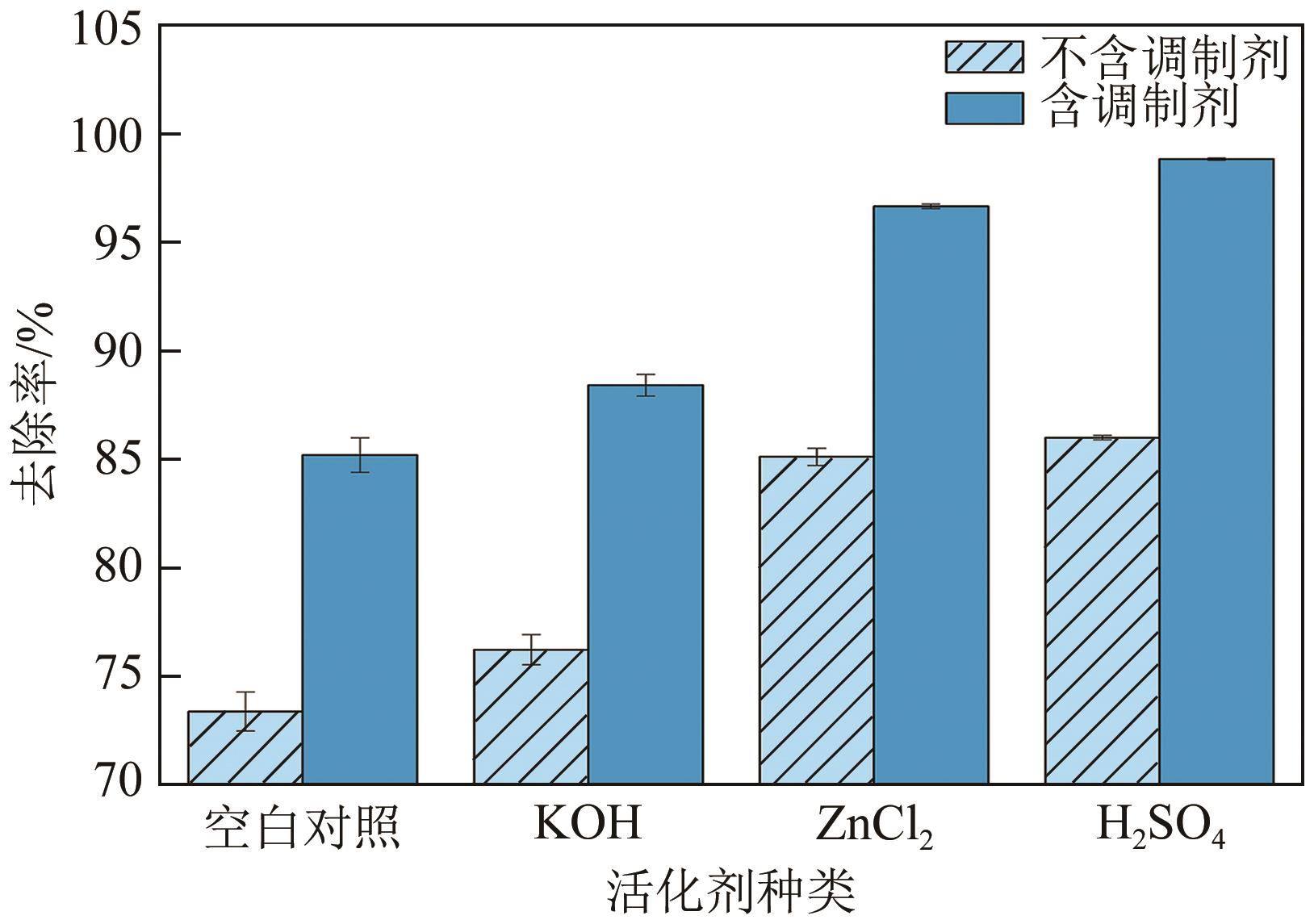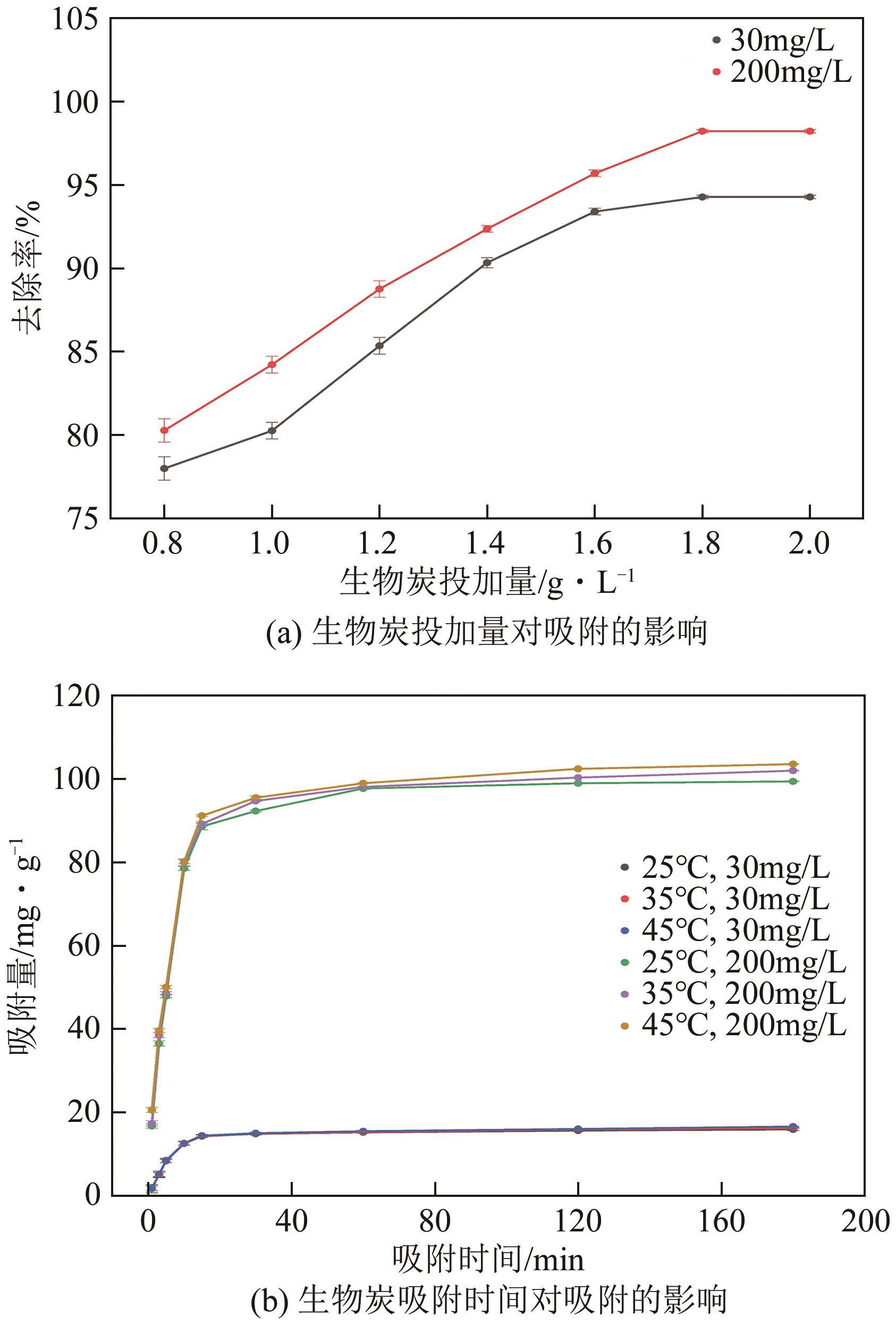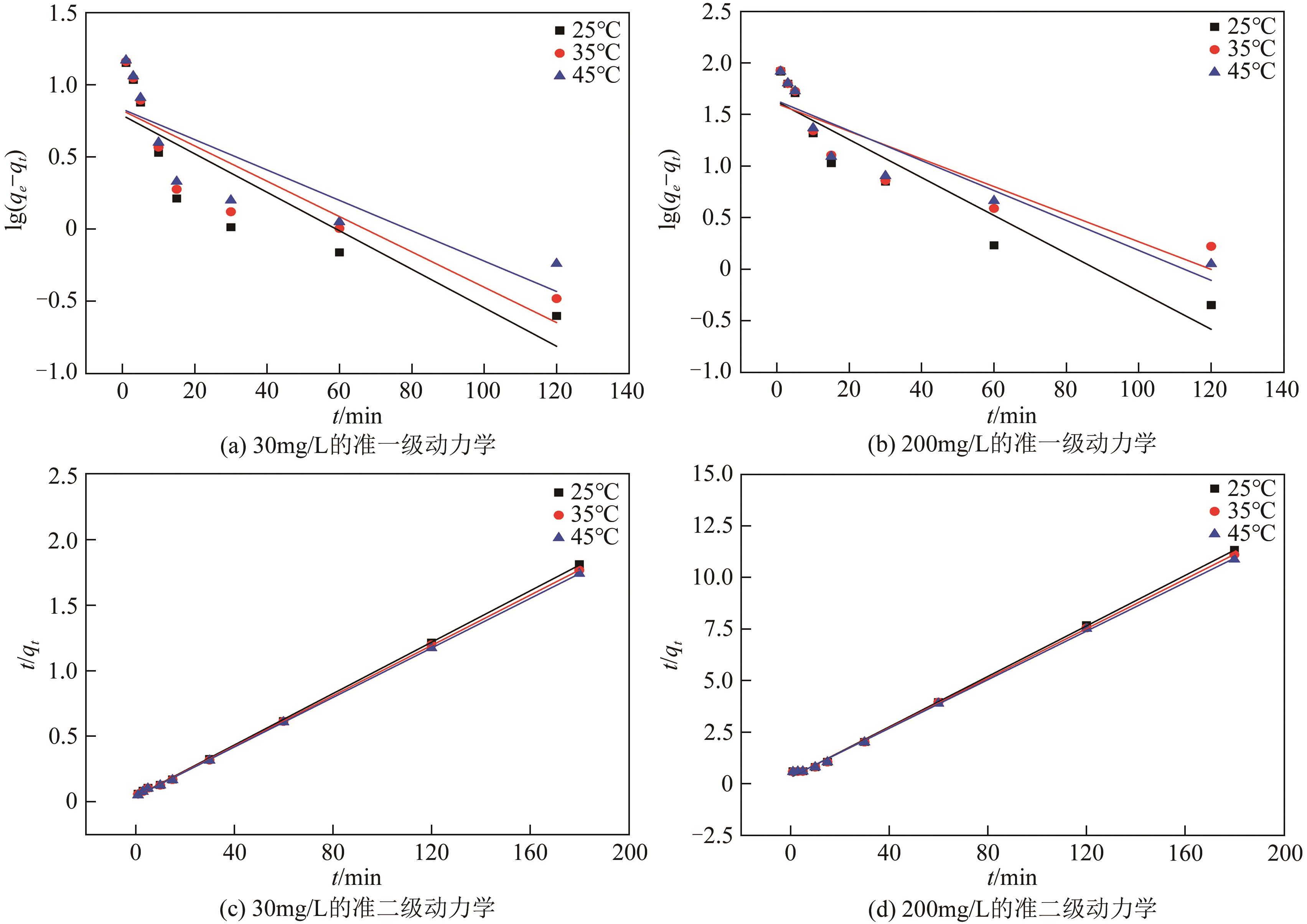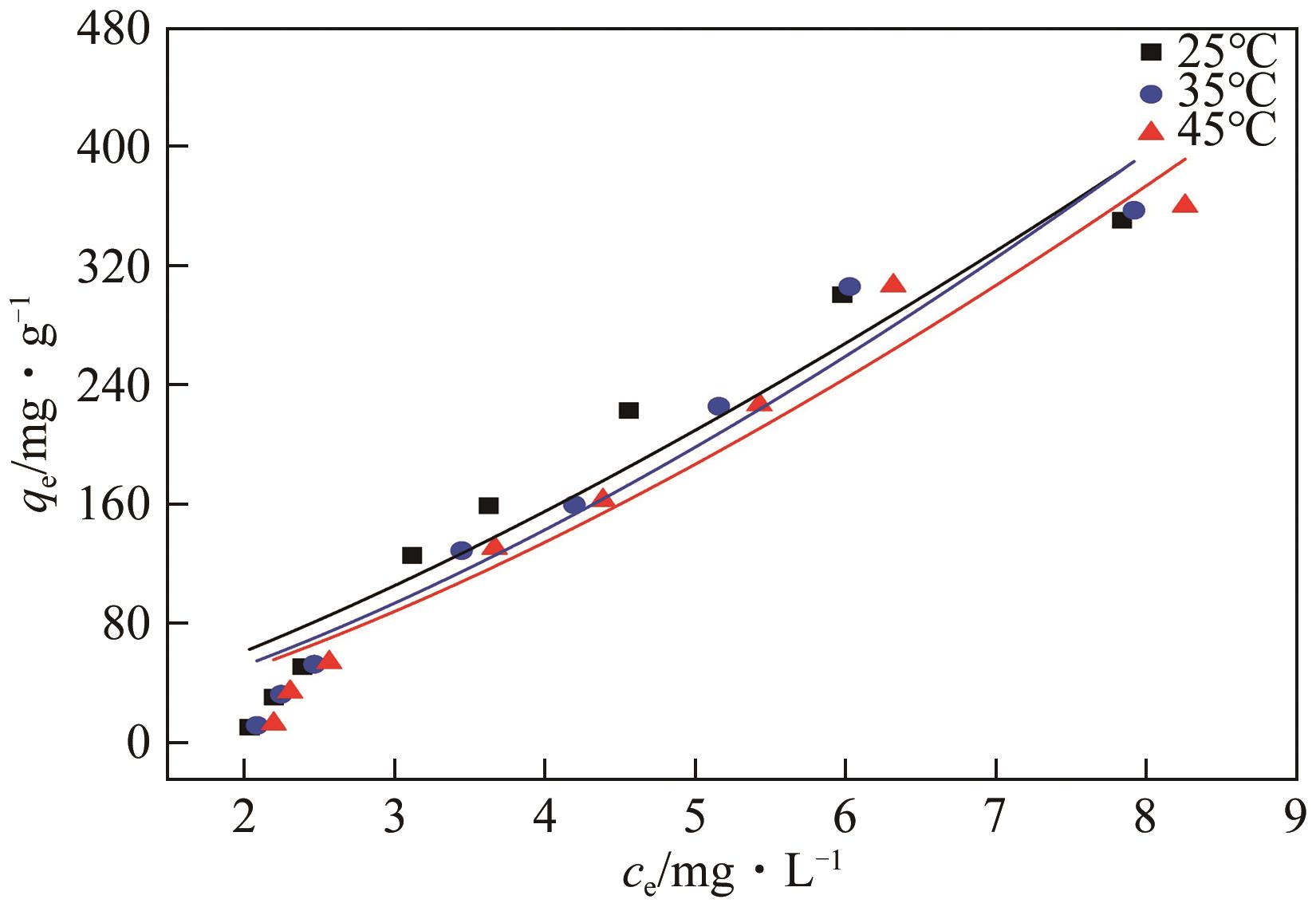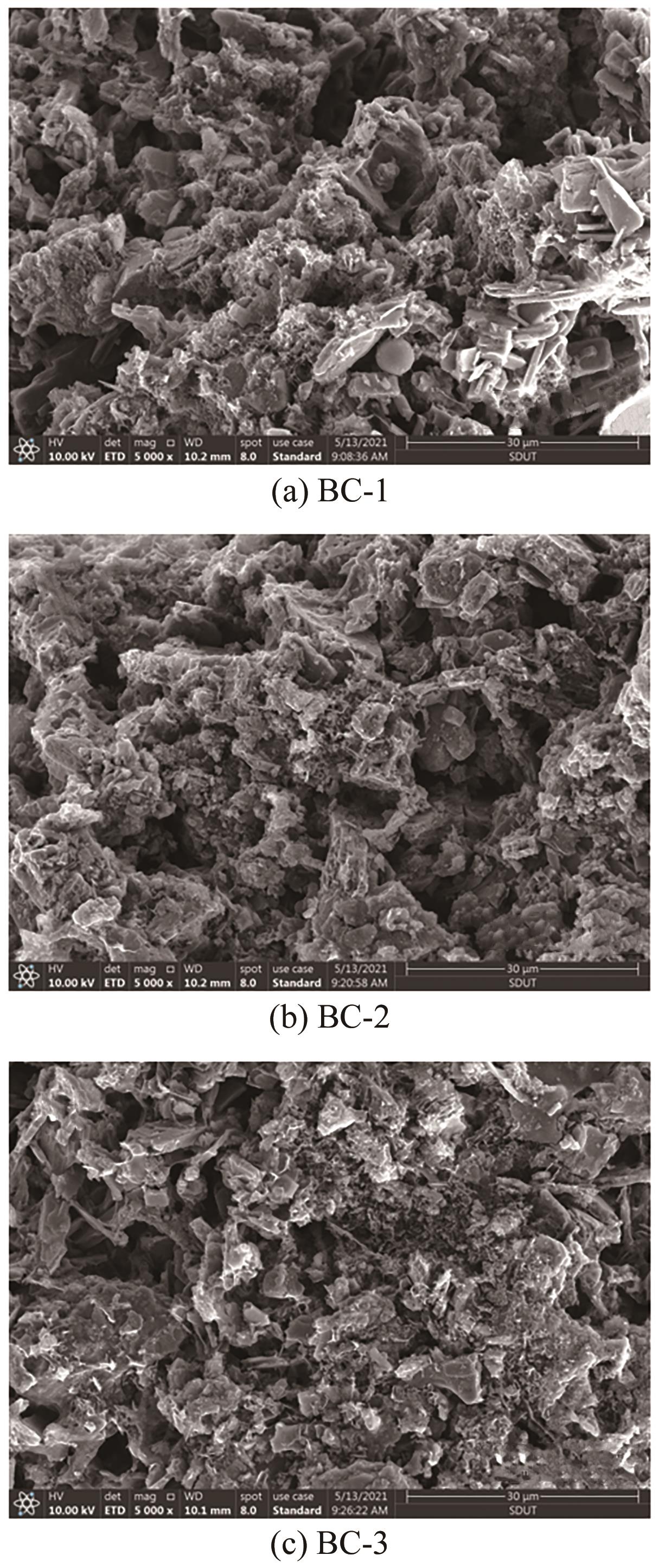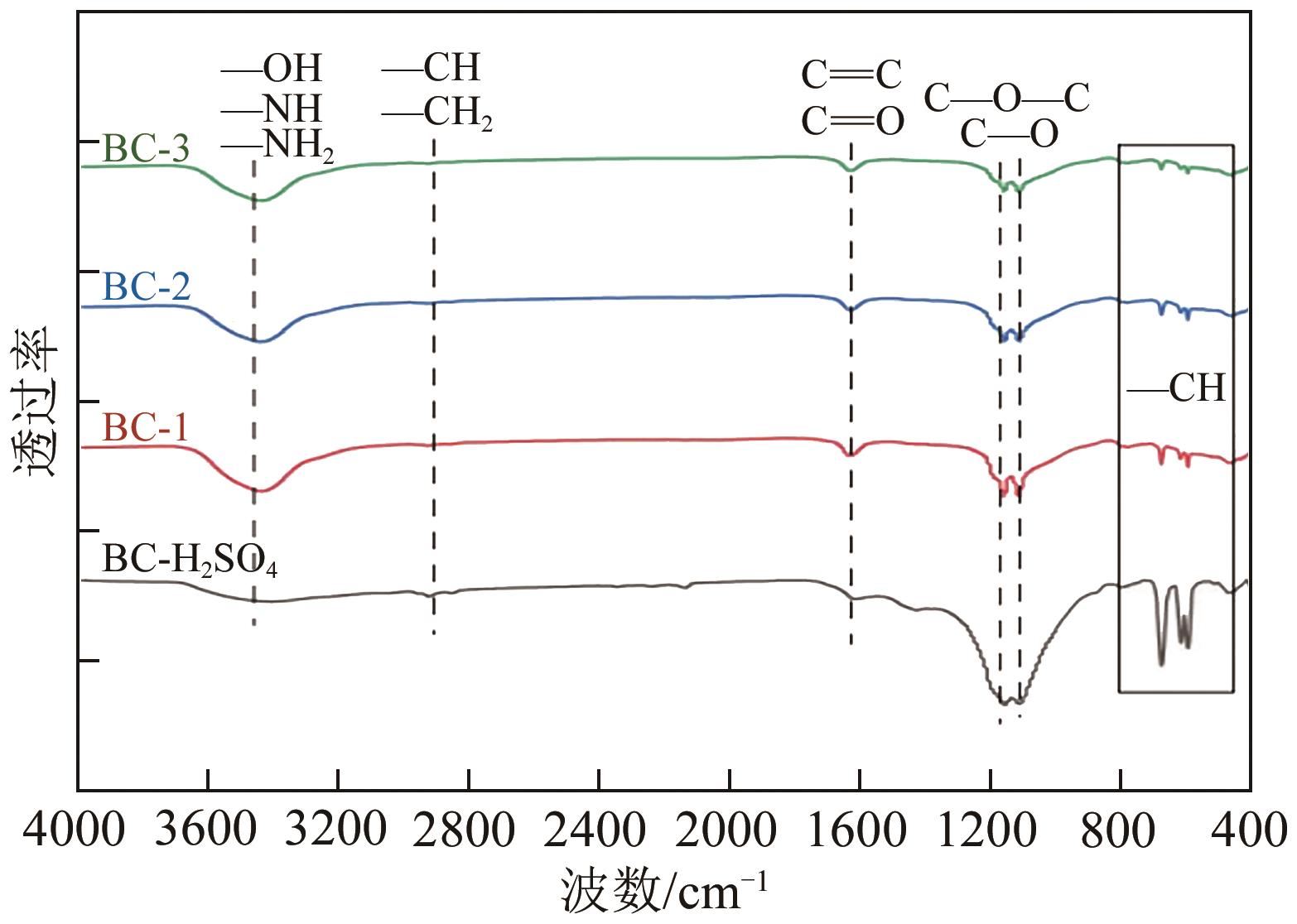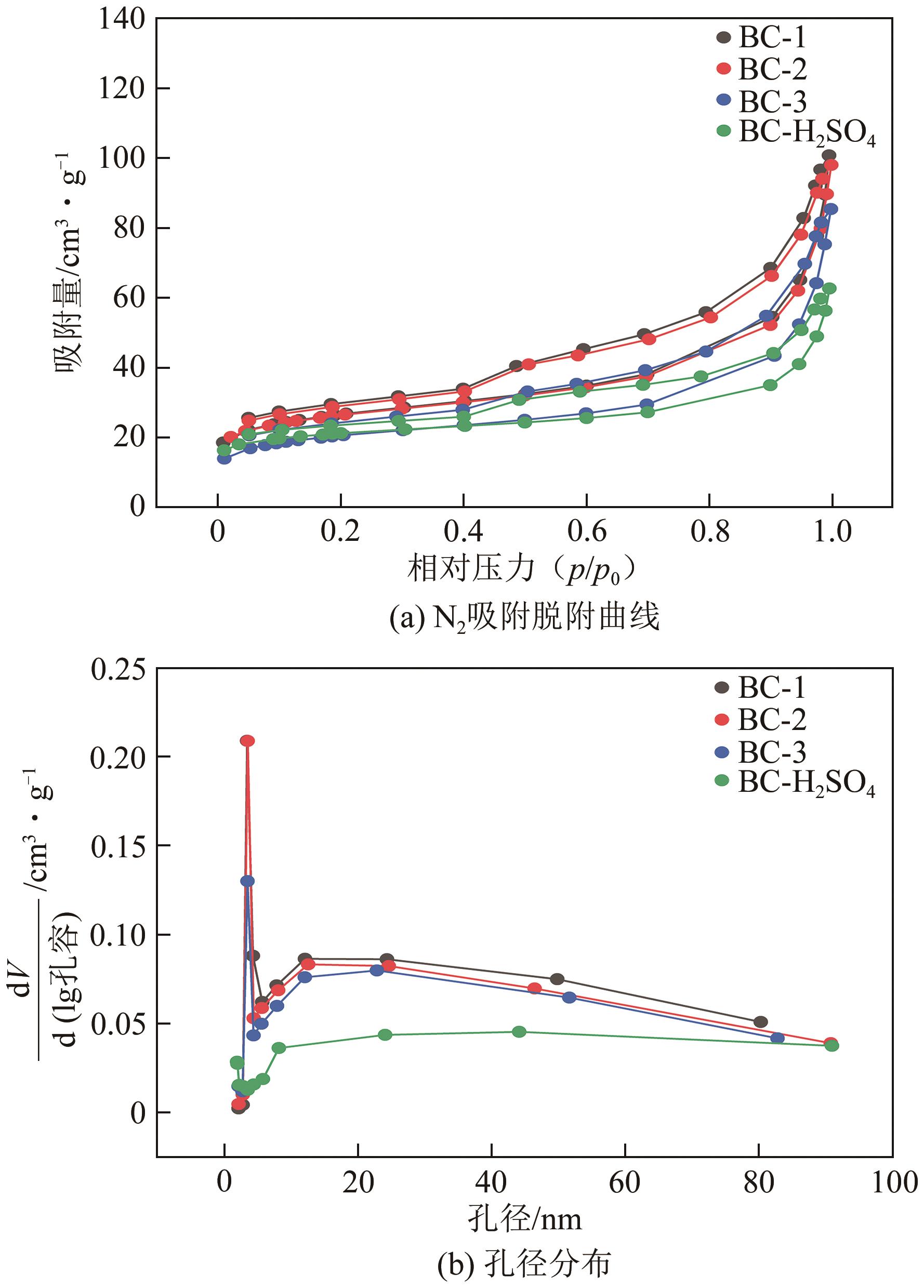化工进展 ›› 2024, Vol. 43 ›› Issue (6): 3398-3409.DOI: 10.16085/j.issn.1000-6613.2023-0751
• 资源与环境化工 • 上一篇
含油污泥基生物炭处理含油废水
姚雪1( ), 武淑慧1, 杨阳1, 王晓1, 冯雷2, 冯雪冬3, 马艳飞3(
), 武淑慧1, 杨阳1, 王晓1, 冯雷2, 冯雪冬3, 马艳飞3( )
)
- 1.山东理工大学农业工程与食品科学学院,山东 淄博 255000
2.山东中科恒源环境工程有限公司,山东 淄博 255000
3.山东理工大学资源与环境工程学院,山东 淄博 255000
-
收稿日期:2023-05-08修回日期:2023-06-14出版日期:2024-06-15发布日期:2024-07-02 -
通讯作者:马艳飞 -
作者简介:姚雪(1999—),女,硕士研究生,研究方向为废水处理。E-mail:761434117@qq.com。 -
基金资助:山东省自然科学基金(ZR2020MD108);黄河三角洲研究院创新引导基金(118171)
Treatment of oily wastewater by oily sludge-based biochar
YAO Xue1( ), WU Shuhui1, YANG Yang1, WANG Xiao1, FENG Lei2, FENG Xuedong3, MA Yanfei3(
), WU Shuhui1, YANG Yang1, WANG Xiao1, FENG Lei2, FENG Xuedong3, MA Yanfei3( )
)
- 1.College of Agricultural Engineering and Food Science, Shandong University of Technology, Zibo 255000, Shandong, China
2.Shandong Zhongke Hengyuan Environmental Engineering Co. , Ltd. , Zibo 255000, Shandong, China
3.School of Resource and Environmental Engineering, Shandong University of Technology, Zibo 255000, Shandong, China
-
Received:2023-05-08Revised:2023-06-14Online:2024-06-15Published:2024-07-02 -
Contact:MA Yanfei
摘要:
为使含油污泥达到无害化处理、资源化利用的目的,本实验通过热解炭化的方法,以含油污泥为实验原料,氧化钙、粉煤灰和十六烷基三甲基溴化铵的混合物为调质剂,玉米秸秆为增碳剂,制备含油污泥基生物炭,并研究其对含油废水中石油类污染物的吸附性能。以石油类污染物去除率为指标,对比了ZnCl2、KOH和H2SO4三种活化剂对生物炭吸附性能的影响;通过扫描电子显微镜、傅里叶变换红外光谱、BET测试法等手段分析了生物炭的比表面积、孔隙结构和表面官能团等性能;采用批量吸附实验和再生实验,研究生物炭对石油类污染物吸附性能及其再生性。研究结果表明,最佳活化剂为H2SO4,H2SO4活化制备的生物炭含有大量孔隙结构且多为介孔,生物炭表面存在—CH、C
中图分类号:
引用本文
姚雪, 武淑慧, 杨阳, 王晓, 冯雷, 冯雪冬, 马艳飞. 含油污泥基生物炭处理含油废水[J]. 化工进展, 2024, 43(6): 3398-3409.
YAO Xue, WU Shuhui, YANG Yang, WANG Xiao, FENG Lei, FENG Xuedong, MA Yanfei. Treatment of oily wastewater by oily sludge-based biochar[J]. Chemical Industry and Engineering Progress, 2024, 43(6): 3398-3409.
| 生物炭 | 比表面积/m²·g-1 | 孔体积/cm³·g-1 | 吸附平均孔隙宽度/nm | 解吸平均孔隙宽度/nm |
|---|---|---|---|---|
| BC-ZnCl2 | 63.86 | 0.006719 | 16.7912 | 15.6882 |
| BC-H2SO4 | 71.81 | 0.017849 | 11.0856 | 8.1207 |
| BC-KOH | 3.13 | 0.000316 | 19.4608 | 16.4600 |
表1 生物炭的比表面积及孔隙结构
| 生物炭 | 比表面积/m²·g-1 | 孔体积/cm³·g-1 | 吸附平均孔隙宽度/nm | 解吸平均孔隙宽度/nm |
|---|---|---|---|---|
| BC-ZnCl2 | 63.86 | 0.006719 | 16.7912 | 15.6882 |
| BC-H2SO4 | 71.81 | 0.017849 | 11.0856 | 8.1207 |
| BC-KOH | 3.13 | 0.000316 | 19.4608 | 16.4600 |
| 温度 /℃ | 样本 | 一级动力学参数 | 二级动力学参数 | ||||
|---|---|---|---|---|---|---|---|
| qe/mg·g-1 | K1/min-1 | R2 | qe/mg·g-1 | K2/min-1 | R2 | ||
| 25 | 30mg/L | 6.14 | 0.013 | 0.7367 | 16.33 | 0.207 | 0.9988 |
| 200mg/L | 42.23 | 0.018 | 0.8735 | 101.93 | 0.2509 | 0.9995 | |
| 35 | 30mg/L | 6.63 | 0.012 | 0.7419 | 16.66 | 0.195 | 0.9989 |
| 200mg/L | 40.33 | 0.013 | 0.7697 | 104.27 | 0.2417 | 0.9996 | |
| 45 | 30mg/L | 6.77 | 0.010 | 0.6778 | 16.96 | 0.185 | 0.9988 |
| 200mg/L | 43.12 | 0.014 | 0.8375 | 105.82 | 0.2490 | 0.9997 | |
表2 生物炭对石油类污染物吸附的动力学方程拟合参数
| 温度 /℃ | 样本 | 一级动力学参数 | 二级动力学参数 | ||||
|---|---|---|---|---|---|---|---|
| qe/mg·g-1 | K1/min-1 | R2 | qe/mg·g-1 | K2/min-1 | R2 | ||
| 25 | 30mg/L | 6.14 | 0.013 | 0.7367 | 16.33 | 0.207 | 0.9988 |
| 200mg/L | 42.23 | 0.018 | 0.8735 | 101.93 | 0.2509 | 0.9995 | |
| 35 | 30mg/L | 6.63 | 0.012 | 0.7419 | 16.66 | 0.195 | 0.9989 |
| 200mg/L | 40.33 | 0.013 | 0.7697 | 104.27 | 0.2417 | 0.9996 | |
| 45 | 30mg/L | 6.77 | 0.010 | 0.6778 | 16.96 | 0.185 | 0.9988 |
| 200mg/L | 43.12 | 0.014 | 0.8375 | 105.82 | 0.2490 | 0.9997 | |
| 温度 /℃ | Langmuir | Freundlich | ||||
|---|---|---|---|---|---|---|
| qm/mg·g-1 | KL/L·mg-1 | R2 | KF/mg·g-1 | 1/n | R2 | |
| 25 | 350.21 | 0.3817 | 0.73985 | 23.7744 | 0.7403 | 0.9163 |
| 35 | 351.86 | 0.3946 | 0.84605 | 18.4215 | 0.6782 | 0.94199 |
| 45 | 352.69 | 0.4826 | 0.72895 | 17.2717 | 0.6768 | 0.94746 |
表3 生物炭对石油类污染物吸附的等温吸附方程拟合参数
| 温度 /℃ | Langmuir | Freundlich | ||||
|---|---|---|---|---|---|---|
| qm/mg·g-1 | KL/L·mg-1 | R2 | KF/mg·g-1 | 1/n | R2 | |
| 25 | 350.21 | 0.3817 | 0.73985 | 23.7744 | 0.7403 | 0.9163 |
| 35 | 351.86 | 0.3946 | 0.84605 | 18.4215 | 0.6782 | 0.94199 |
| 45 | 352.69 | 0.4826 | 0.72895 | 17.2717 | 0.6768 | 0.94746 |
| 生物炭 | 比表面积 /m²·g-1 | 微孔体积 /cm³·g-1 | 吸附平均孔隙宽 /nm | 解吸平均孔隙宽 /nm | 吸附量/mg·g-1 | 再生效率/% | 再生损失率 /% | ||
|---|---|---|---|---|---|---|---|---|---|
| 30mg/L | 200mg/L | 30mg/L | 200mg/L | ||||||
| BC-H2SO4 | 71.81 | 0.017849 | 11.0856 | 8.1207 | 15.88 | 99.32 | — | — | — |
| BC-1 | 91.20 | 0.015975 | 10.5945 | 8.7705 | 14.03 | 99.21 | 93.21 | 99.98 | 12.42 |
| BC-2 | 90.75 | 0.016016 | 10.9312 | 8.7245 | 13.97 | 99.10 | 92.98 | 99.27 | 13.95 |
| BC-3 | 71.25 | 0.011243 | 11.3952 | 9.1548 | 13.82 | 99.02 | 91.66 | 99.05 | 14.81 |
表4 再生后的生物炭性能参数
| 生物炭 | 比表面积 /m²·g-1 | 微孔体积 /cm³·g-1 | 吸附平均孔隙宽 /nm | 解吸平均孔隙宽 /nm | 吸附量/mg·g-1 | 再生效率/% | 再生损失率 /% | ||
|---|---|---|---|---|---|---|---|---|---|
| 30mg/L | 200mg/L | 30mg/L | 200mg/L | ||||||
| BC-H2SO4 | 71.81 | 0.017849 | 11.0856 | 8.1207 | 15.88 | 99.32 | — | — | — |
| BC-1 | 91.20 | 0.015975 | 10.5945 | 8.7705 | 14.03 | 99.21 | 93.21 | 99.98 | 12.42 |
| BC-2 | 90.75 | 0.016016 | 10.9312 | 8.7245 | 13.97 | 99.10 | 92.98 | 99.27 | 13.95 |
| BC-3 | 71.25 | 0.011243 | 11.3952 | 9.1548 | 13.82 | 99.02 | 91.66 | 99.05 | 14.81 |
| 1 | 李瑞娜, 朱红霞, 宋海燕, 等. 含油污泥的热解及尾渣制陶粒工艺研究[J]. 工业安全与环保, 2023, 49(4): 98-103. |
| LI Ruina, ZHU Hongxia, SONG Haiyan, et al. Study on technology of oily sludge pyrolysis and ceramsite preparation from pyrolysis residue[J]. Industrial Safety and Environmental Protection, 2023, 49(4): 98-103. | |
| 2 | 朱桂丹, 何伟, 陕洁, 等. 含油污泥热解技术研究现状与进展[J]. 广东化工, 2021, 48(17): 34-36. |
| ZHU Guidan, HE Wei, SHAN Jie, et al. Progress and prospects on the pyrolysis technology of oily sludge[J]. Guangdong Chemical Industry, 2021, 48(17): 34-36. | |
| 3 | WANG Aiyue, SUN Kai, WU Liping, et al. Co-carbonization of biomass and oily sludge to prepare sulfamethoxazole super-adsorbent materials[J]. Science of the Total Environment, 2020, 698: 134238. |
| 4 | 张磊, 谭潇, 齐随涛. 含油污泥催化热解技术研究进展[J]. 现代化工, 2021, 41(9): 57-60. |
| ZHANG Lei, TAN Xiao, QI Suitao. Research progress on catalytic pyrolysis of oily sludge[J]. Modern Chemical Industry, 2021, 41(9): 57-60. | |
| 5 | 王玉华, 陈传帅, 孟娟, 等. 含油污泥处置技术的新发展及其应用现状[J]. 安全与环境工程, 2018, 25(3): 103-110. |
| WANG Yuhua, CHEN Chuanshuai, MENG Juan, et al. Development and application of disposal techniques on oil sludge[J]. Safety and Environmental Engineering, 2018, 25(3): 103-110. | |
| 6 | 文静, 李茹, 李凤, 等. 石油工业含油污泥的无害化处理技术及应用[J]. 化学工程师, 2021, 35(12): 51-53. |
| WEN Jing, LI Ru, LI Feng, et al. Technology and application of harmless treatment of oily sludge in petroleum industry[J]. Chemical Engineer, 2021, 35(12): 51-53. | |
| 7 | AL-HAWASH Adnan B, DRAGH Maytham A, LI Shue, et al. Principles of microbial degradation of petroleum hydrocarbons in the environment[J]. Egyptian Journal of Aquatic Research, 2018, 44(2): 71-76. |
| 8 | 刘亚鹏. 疏水亲油复合材料的制备及其处理含油废水的研究[D]. 北京: 北京化工大学, 2017. |
| LIU Yapeng. Prepaation of hydrophobic and oleophilic materials and their properties in oil/water separation[D]. Beijing: Beijing University of Chemical Technology, 2017. | |
| 9 | 李薇. MnWO4/WO3复合光催化剂的制备及其在含油废水处理中的应用[J]. 化学研究与应用, 2022, 34(5): 964-973. |
| LI Wei. Preparation of MnWO4/WO3 composite photocatalyst and its application in the treatment of oil-containing wastewater[J]. Chemical Research and Application, 2022, 34(5): 964-973. | |
| 10 | 李仕博. 电辅助聚乙烯醇改性煤基炭膜处理含油废水的研究[D]. 大连: 大连海事大学, 2021. |
| LI Shibo. Study on the treatment of oily wastewater by electric-assisted polyvinyl alcohol modified coal-based carbon membrane[D].Dalian: Dalian Maritime University, 2021. | |
| 11 | 刘梅, 薛代惠美, 郭玉超, 等. 磁性生物炭材料在含油废水处理中的应用研究[J]. 现代化工, 2021, 41(3): 149-153. |
| LIU Mei, XUE Daihuimei, GUO Yuchao, et al. Study on application of magnetic biochar in treatment of oil-bearing wastewater[J]. Modern Chemical Industry, 2021, 41(3): 149-153. | |
| 12 | 杜明明. 含油污泥基吸附碳材料的制备及其除油性能研究[D]. 西安: 西安石油大学, 2020. |
| DU Mingming. The preparation of carbon material based on oily sludge and its ability of removing crude oil[D]. Xi’an: Xi’an Shiyou University, 2020. | |
| 13 | 王琴婷, 孙妩娟, 柯从玉, 等. 油气田含油污泥处理技术研究进展[J]. 广州化工, 2022, 50(7): 7-10. |
| WANG Qinting, SUN Wujuan, KE Congyu, et al. Development of oily sludge treatment technology in oil and gas fields[J]. Guangzhou Chemical Industry, 2022, 50(7): 7-10. | |
| 14 | 汤超, 熊小伟, 蔡文良, 等. 含油污泥热解残渣中热解炭的回收及应用研究[J]. 石油与天然气化工, 2021, 50(1): 124-128, 134. |
| TANG Chao, XIONG Xiaowei, CAI Wenliang, et al. Recycling of pyrolytic carbon in oily sludge residues[J]. Chemical Engineering of Oil & Gas, 2021, 50(1): 124-128, 134. | |
| 15 | 尚贞晓, 赵庚, 马艳飞. 含油污泥催化热解及残渣资源化利用实验研究[J]. 石油与天然气化工, 2021, 50(6): 115-119, 125. |
| SHANG Zhenxiao, ZHAO Geng, MA Yanfei. Experimental study on catalytic pyrolysis of oily sludge and recycling of the residue[J]. Chemical Engineering of Oil & Gas, 2021, 50(6): 115-119, 125. | |
| 16 | 田昆山, 彭峰, 何丕文, 等. 含油污泥与松木锯末共热解特性及动力学分析[J]. 环境科学与技术, 2021, 44(10): 131-136. |
| TIAN Kunshan, PENG Feng, HE Piwen, et al. Co-pyrolysis of oily sludge with pine sawdust: Properties and kinetics analysis[J]. Environmental Science & Technology, 2021, 44(10): 131-136. | |
| 17 | 汪建柱, 巩志强, 朱丽云, 等. 含油污泥催化热解研究进展[J]. 应用化工, 2022, 51(4): 1164-1167, 1173. |
| WANG Jianzhu, GONG Zhiqiang, ZHU Liyun, et al. Research progress of catalytic pyrolysis of oil sludge[J]. Applied Chemical Industry, 2022, 51(4): 1164-1167, 1173. | |
| 18 | 韩冬云, 曹蕊, 曹祖斌. 含油污泥低温热解[J]. 沈阳大学学报(自然科学版), 2022, 34(3): 169-174, 182. |
| HAN Dongyun, CAO Rui, CAO Zubin. Low-temperature pyrolysis of oily sludge[J]. Journal of Shenyang University (Natural Science), 2022, 34(3): 169-174, 182. | |
| 19 | 赵衡振, 陈德珍, 洪鎏, 等. 含油污泥热解工艺及目标产物定位[J]. 石油学报(石油加工), 2020, 36(3): 557-567. |
| ZHAO Hengzhen, CHEN Dezhen, HONG Liu, et al. Target products of oily sludges pyrolysis disposal[J]. Acta Petrolei Sinica (Petroleum Processing Section), 2020, 36(3): 557-567. | |
| 20 | 卢智, 朱新萍, 俞音, 等. 含油污泥热解残渣制备催化剂及其在热解中的应用[J]. 新疆农业大学学报, 2020, 43(6): 445-452. |
| LU Zhi, ZHU Xinping, YU Yin, et al. Preparation of catalyst from pyrolysis residue of oily sludge and its application in pyrolysis[J]. Journal of Xinjiang Agricultural University, 2020, 43(6): 445-452. | |
| 21 | HUANG Yang, LI Shunxing, CHEN Jianhua, et al. Adsorption of Pb(Ⅱ) on mesoporous activated carbons fabricated from water hyacinth using H3PO4 activation: Adsorption capacity, kinetic and isotherm studies[J]. Applied Surface Science, 2014, 293: 160-168. |
| 22 | WU Weidong, LI Jianhong, NIAZI Nabeel Khan, et al. Influence of pyrolysis temperature on lead immobilization by chemically modified coconut fiber-derived biochars in aqueous environments[J]. Environmental Science and Pollution Research International, 2016, 23(22): 22890-22896. |
| 23 | 李金灵, 张甜甜, 鱼涛, 等. 含油污泥热解残渣的制备及吸附性能综合性教学实验设计[J]. 实验技术与管理, 2021, 38(9): 187-190. |
| LI Jinling, ZHANG Tiantian, YU Tao, et al. Comprehensive experimental design of preparation and adsorption of oily sludge pyrolysis residue[J]. Experimental Technology and Management, 2021, 38(9): 187-190. | |
| 24 | 朱米家, 刘瑞平, 武笑影, 等. 改性核桃壳对石油烃类物质的吸附试验研究[J]. 环境工程, 2015, 33(6): 54-58. |
| ZHU Mijia, LIU Ruiping, WU Xiaoying, et al. Adsorption of petroleum hydrocarbon by modified walnut shell[J]. Environmental Engineering, 2015, 33(6): 54-58. | |
| 25 | 李晶. 污泥生物炭改性材料制备及除磷机理研究[D]. 秦皇岛: 燕山大学, 2020. |
| LI Jing. Investigation on preparation and phosphate removal mechanism of sludge biochar modified materials[D]. Qinhuangdao: Yanshan University, 2020. | |
| 26 | 张小蝶. 蟹壳生物炭材料的制备及对柴油吸附性能的研究[D]. 舟山: 浙江海洋大学, 2018. |
| ZHANG Xiaodie. Study on the optimized preparation of carp charcoal and its adsorption to diesel oil[D]. Zhoushan: Zhejiang Ocean University, 2018. | |
| 27 | 周协鸿. 杏壳等生物质在含油污泥脱水及热解中作用的研究[D]. 西安: 西北大学, 2016. |
| ZHOU Xiehong. Study on the effect of apricot shell and other biomasses on the dehydration and pyrolysis of oily sludge[D]. Xi’an: Northwest University, 2016. | |
| 28 | 杨嫱, 张宇, 贺雪红, 等. 含油污泥热解工艺优化及资源化利用[J]. 油气田环境保护, 2022, 32(4): 32-36. |
| YANG Qiang, ZHANG Yu, HE Xuehong, et al. Optimization and resource utilization of oily sludge for the pyrolysis process[J]. Environmental Protection of Oil & Gas Fields, 2022, 32(4): 32-36. | |
| 29 | WANG Zhipu, XIE Like, LIU Kai, et al. Co-pyrolysis of sewage sludge and cotton stalks[J]. Waste Management, 2019, 89: 430-438. |
| 30 | 吴嘉煦, 李凯, 孙鑫, 等. 载镧酒糟污泥生物炭对磷的吸附性能及机理[J]. 环境工程学报, 2022, 16(12): 3884-3894. |
| WU Jiaxu, LI Kai, SUN Xin, et al. Fabrication of La-LBCZ composites for phosphate removal: Adsorption performance and mechanism[J]. Chinese Journal of Environmental Engineering, 2022, 16(12): 3884-3894. | |
| 31 | BAO Diandian, LI Zhengwen, TANG Rui, et al. Metal-modified sludge-based biochar enhance catalytic capacity: Characteristics and mechanism[J]. Journal of Environmental Management, 2021, 284: 112113. |
| 32 | 胡兆岩, 张景新, 何义亮. Fe负载污泥生物炭催化热解聚丙烯及产物特性[J]. 化工进展, 2023, 42(2): 631-640. |
| HU Zhaoyan, ZHANG Jingxin, HE Yiliang. Catalytic pyrolysis of polypropylene plastics and product properties with Fe-loaded sludge biochar[J]. Chemical Industry and Engineering Progress, 2023, 42(2): 631-640. | |
| 33 | YUAN Yong, BOLAN Nanthi, Antonin PRÉVOTEAU, et al. Applications of biochar in redox-mediated reactions[J]. Bioresource Technology, 2017, 246: 271-281. |
| 34 | 高豆豆, 郭敏辉, 王侃, 等. 城镇有机垃圾热解生物炭对水中亚甲基蓝的吸附[J]. 环境工程学报, 2019, 13(5): 1165-1174. |
| GAO Doudou, GUO Minhui, WANG Kan, et al. Adsorption of aqueous methylene blue by biochar pyrolyzed from municipal solid waste[J]. Chinese Journal of Environmental Engineering, 2019, 13(5): 1165-1174. | |
| 35 | 周佳伟, 施维林, 许伟, 等. 污泥生物炭硼掺杂改性及其对水中1, 2-二氯乙烷吸附行为和机制[J]. 环境科学, 2023, 44(5): 2671-2680. |
| ZHOU Jiawei, SHI Weilin, XU Wei, et al. Sludge biochar modified by B-doped and its adsorption behavior and mechanism of 1, 2-DCA in water[J]. Environmental Science, 2023, 44(5): 2671-2680. | |
| 36 | 王亚. 柚皮基生物炭的制备及其吸附性能研究[D]. 镇江: 江苏大学, 2017. |
| WANG Ya. Preparation and adsorption performance of biochar derived from pomelo peels[D]. Zhenjiang: Jiangsu University, 2017. | |
| 37 | LENG Lijian, YUAN Xingzhong, HUANG Huajun, et al. Characterization and application of bio-chars from liquefaction of microalgae, lignocellulosic biomass and sewage sludge[J]. Fuel Processing Technology, 2015, 129: 8-14. |
| 38 | KONG Lingjun, XIONG Ya, SUN Lianpeng, et al. Sorption performance and mechanism of a sludge-derived char as porous carbon-based hybrid adsorbent for benzene derivatives in aqueous solution[J]. Journal of Hazardous Materials, 2014, 274: 205-211. |
| 39 | 张佳玲, 方芳, 董锦云, 等. 改性污泥质生物炭吸附污水中有机污染物的研究进展[J]. 环境化学, 2021, 40(10): 3144-3157. |
| ZHANG Jialing, FANG Fang, DONG Jinyun, et al. Research progress on the removal of organic contaminants from wastewater by modified sludge-based biochar[J]. Environmental Chemistry, 2021, 40(10): 3144-3157. | |
| 40 | 史月月, 单锐, 袁浩然. 改性稻壳生物炭对水溶液中甲基橙的吸附效果与机制[J]. 环境科学, 2019, 40(6): 2783-2792. |
| SHI Yueyue, SHAN Rui, YUAN Haoran. Effects and mechanisms of methyl orange removal from aqueous solutions by modified rice shell biochar[J]. Environmental Science, 2019, 40(6): 2783-2792. | |
| 41 | LIN Lina, QIU Weiwen, WANG Di, et al. Arsenic removal in aqueous solution by a novel Fe-Mn modified biochar composite: Characterization and mechanism[J]. Ecotoxicology and Environmental Safety, 2017, 144: 514-521. |
| 42 | SHI Tianzhu, XIE Zhengfeng, MO Xinliang, et al. Adsorption behaviors of heavy metal ions by different hydrazone-modified sodium alginate in aqueous medium: Experimental and DFT studies[J]. Colloids and Surfaces A: Physicochemical and Engineering Aspects, 2023, 659: 130754. |
| 43 | 范世锁, 刘文浦, 王锦涛, 等. 茶渣生物炭制备及其对溶液中四环素的去除特性[J]. 环境科学, 2020, 41(3): 1308-1318. |
| FAN Shisuo, LIU Wenpu, WANG Jintao, et al. Preparation of tea waste biochar and its application in tetracycline removal from aqueous solution[J]. Environmental Science, 2020, 41(3): 1308-1318. | |
| 44 | 张博凡, 徐文斐, 王加华, 等. 菌糠炭与微生物协同吸附-降解石油烃类污染物[J]. 石油学报(石油加工), 2019, 35(4): 736-743. |
| ZHANG Bofan, XU Wenfei, WANG Jiahua, et al. Adsorption and degradation of petroleum hydrocarbon with biochars and microorganisms[J]. Acta Petrolei Sinica (Petroleum Processing Section), 2019, 35(4): 736-743. | |
| 45 | 赵莹莹. 利用海产废弃物制备生物炭吸附海水中石油的研究[D]. 青岛: 青岛理工大学, 2021. |
| ZHAO Yingying. Study on useing biochar prepared by marine waste to adsorb oil from seawater[D]. Qingdao: Qingdao Tehcnology University, 2021. | |
| 46 | 刘庆玉, 王永超, 梅自力, 等. 氯化锌浸渍水稻秸秆制备生物炭吸附氯霉素的机理研究[J]. 沈阳农业大学学报, 2021, 52(5): 557-567. |
| LIU Qingyu, WANG Yongchao, MEI Zili, et al. Removal of chloramphenicol from aqueous solution by zinc chloride modified rice straw-derived biochar[J]. Journal of Shenyang Agricultural University, 2021, 52(5): 557-567. | |
| 47 | 王丹丹, 林静雯, 张岩, 等. 牛粪生物炭对Cd2+的吸附影响因素及特性[J]. 环境工程学报, 2015, 9(7): 3197-3203. |
| WANG Dandan, LIN Jingwen, ZHANG Yan, et al. Cd2+ adsorption influential factors and performance of dairy dung biochar[J]. Chinese Journal of Environmental Engineering, 2015, 9(7): 3197-3203. | |
| 48 | 张秋亚, 康旭栋, 彭明国, 等. 磁性污泥基生物炭的制备及其对水溶液中氮磷的同步回收[J]. 环境工程学报, 2022, 16(11): 3558-3568. |
| ZHANG Qiuya, KANG Xudong, PENG Mingguo, et al. Preparation of magnetic sludge-based biochar for the simultaneous recovery of nitrogen and phosphorus from aqueous solution[J]. Chinese Journal of Environmental Engineering, 2022, 16(11): 3558-3568. | |
| 49 | 党娅琴, 邢英. 稻壳生物炭吸附无机汞和甲基汞的特征研究[J]. 地球与环境, 2022, 50(5): 666-675. |
| DANG Yaqin, XING Ying. The characteristic of adsorption of inorganic mercury and methylmercury by rice husk biochar[J]. Earth and Environment, 2022, 50(5): 666-675. | |
| 50 | 王玉, 余广炜, 江汝清, 等. 餐厨厌氧沼渣生物炭吸附盐酸环丙沙星[J]. 化工进展, 2023, 42(4): 2160-2170. |
| WANG Yu, YU Guangwei, JIANG Ruqing, et al. Adsorption of ciprofloxacin hydrochloride by biochar from food waste digestate residues[J]. Chemical Industry and Engineering Progress, 2023, 42(4): 2160-2170. | |
| 51 | 商岑尧, 顾若婷, 张强, 等. 秸秆生物炭吸附对乙酰氨基酚的机制及其位能分布特征[J]. 环境科学, 2022, 43(9): 4888-4901. |
| SHANG Cenyao, GU Ruoting, ZHANG Qiang, et al. Sorption mechanism and site energy distribution of acetaminophen on straw-derived biochar[J]. Environmental Science, 2022, 43(9): 4888-4901. | |
| 52 | 韩志勇, 杜承臻, 张娟, 等. 玉米秸秆生物炭的制备改性及其对孔雀石绿染料的吸附效果[J]. 石油化工, 2023, 52(2): 199-208. |
| HAN Zhiyong, DU Chengzhen, ZHANG Juan, et al. Preparation and modification of corn straw biochar and its adsorption effect on malachite green dye[J]. Petrochemical Technology, 2023, 52(2): 199-208. | |
| 53 | 赵莹莹, 夏文香, 赵俊凯, 等. 虾壳生物炭的制备及其对海水中石油的吸附探究[J]. 青岛理工大学学报, 2022, 43(2): 111-117. |
| ZHAO Yingying, XIA Wenxiang, ZHAO Junkai, et al. Study on preparation of shrimp shell biochar and its adsorption of petroleum in seawater[J]. Journal of Qingdao University of Technology, 2022, 43(2): 111-117. | |
| 54 | 陈钰, 曾广婷, 刘梅, 等. 污泥基生物炭固定化菌处理海洋溢油的研究[J]. 浙江海洋大学学报(自然科学版), 2022, 41(3): 233-240. |
| CHEN Yu, ZENG Guangting, LIU Mei, et al. Treatment of marine oil spill by sludge-based biochar immobilized bacteria[J]. Journal of Zhejiang Ocean University (Natural Science), 2022, 41(3): 233-240. | |
| 55 | 范福强, 李颖洁, 方栩, 等. 生物炭及其复合材料去除水体石油烃研究进展[J]. 环境科学与技术, 2022, 45(7): 187-200. |
| FAN Fuqiang, LI Yingjie, FANG Xu, et al. Research advances in removal of petroleum hydrocarbons from water by biochar and its composites[J]. Environmental Science & Technology, 2022, 45(7): 187-200. | |
| 56 | MADHUBASHANI A M P, GIANNAKOUDAKIS Dimitrios A, AMARASINGHE B M W P K, et al. Propensity and appraisal of biochar performance in removal of oil spills: A comprehensive review[J]. Environmental Pollution, 2021, 288: 117676. |
| 57 | SINGH Raghuvir, NAIK Desavath V, DUTTA R K, et al. Biochars for the removal of naphthenic acids from water: A prospective approach towards remediation of petroleum refinery wastewater[J]. Journal of Cleaner Production, 2020, 266: 121986. |
| 58 | LU Huanliang, ZHANG Weihua, WANG Shizhong, et al. Characterization of sewage sludge-derived biochars from different feedstocks and pyrolysis temperatures[J]. Journal of Analytical and Applied Pyrolysis, 2013, 102: 137-143. |
| 59 | GUO Dabin, LI Yuexin, CUI Baihui, et al. Natural adsorption of methylene blue by waste fallen leaves of Magnoliaceae and its repeated thermal regeneration for reuse[J]. Journal of Cleaner Production, 2020, 267: 121903. |
| [1] | 刘克峰, 刘陶然, 蔡勇, 胡雪生, 董卫刚, 周华群, 高飞. 二氧化碳捕集技术研究和工程示范进展[J]. 化工进展, 2024, 43(6): 2901-2914. |
| [2] | 智远, 马吉亮, 陈晓平, 刘道银, 梁财. 流化床喷雾浸渍制备负载型钠基CO2吸附剂脱碳性能[J]. 化工进展, 2024, 43(6): 2961-2967. |
| [3] | 刘京都, 余关龙, 龙志奇, 周璐, 包璞瑞, 滕骏毅, 杜春艳. 纳米球状LaAlO3的制备及其在酸性条件下的除氟性能[J]. 化工进展, 2024, 43(6): 3199-3208. |
| [4] | 王厚然, 李德念, 董楠航, 阳济章, 倪轩辕, 叶嘉鸿, 袁浩然, 陈勇. 退役磷酸铁锂电池与三元锂电池正极材料直接修复研究进展[J]. 化工进展, 2024, 43(6): 3336-3346. |
| [5] | 苗诒贺, 王耀祖, 刘雨杭, 朱炫灿, 李佳, 于立军. 添加剂改性固态胺吸附剂用于碳捕集的研究进展[J]. 化工进展, 2024, 43(5): 2739-2759. |
| [6] | 郑可欣, 江雨欣, 毕可鑫, 赵祺铭, 陈少臣, 王冰冰, 任俊宇, 吉旭, 邱彤, 戴一阳. 用于蒸汽裂解产物成分预测的集成迁移学习框架[J]. 化工进展, 2024, 43(5): 2880-2889. |
| [7] | 陈科宇, 徐金鑫, 吴桂波, 杨哲, 陈嘉鸿, 陈永利. 绿氨产业现状及发展展望[J]. 化工进展, 2024, 43(5): 2544-2553. |
| [8] | 李思, 陶艺月, 肖振翀, 张亮, 李俊, 朱恂, 廖强. 热再生电池堆-二氧化碳电化学还原池系统耦合特性[J]. 化工进展, 2024, 43(5): 2568-2575. |
| [9] | 张金鹏, 屈婷, 荆洁颖, 李文英. 吸附强化水气变换制氢复合催化剂研究进展[J]. 化工进展, 2024, 43(5): 2629-2644. |
| [10] | 王德斌, 林梦雨, 杨雪, 董殿权. 锌掺杂型钛系铯离子筛的制备及其吸附性能[J]. 化工进展, 2024, 43(4): 1953-1961. |
| [11] | 廖昌建, 张可伟, 王晶, 曾翔宇, 金平, 刘志禹. 直接空气捕集二氧化碳技术研究进展[J]. 化工进展, 2024, 43(4): 2031-2048. |
| [12] | 路广军, 韩晋钢, 陈英, 马志斌. 镁渣基多孔材料的制备及其对废水中Pb2+的吸附性能[J]. 化工进展, 2024, 43(4): 2126-2134. |
| [13] | 吴晨赫, 刘彧旻, 杨昕旻, 崔记伟, 姜韶堃, 叶金花, 刘乐全. 粉体光催化全水分解技术研究进展[J]. 化工进展, 2024, 43(4): 1810-1822. |
| [14] | 金彬浩, 朱小倩, 柯天, 张治国, 鲍宗必, 任其龙, 苏宝根, 杨启炜. 芳香烃/环烷烃吸附分离材料研究进展[J]. 化工进展, 2024, 43(4): 1863-1881. |
| [15] | 杨东晓, 熊启钊, 王毅, 陈杨, 李立博, 李晋平. 多级孔MOF的制备及其吸附分离应用研究进展[J]. 化工进展, 2024, 43(4): 1882-1896. |
| 阅读次数 | ||||||
|
全文 |
|
|||||
|
摘要 |
|
|||||
